"If you put it in your DVD player today you'll feel like it was written
last week. The commoditization of the news and the devaluing of
truth are just a part of our way of life now. You wish Chayefsky
could come back to life long enough to write 'The Internet.'" |
Creator of The West Wing and The Newsroom
and writing award magnet, Aaron Sorkin" |
I have been working in the film and television industry for 30 years. Hand on heart, there is nothing in this wondrous satire that does not ring horribly and, dare I say, deliciously true. And it's becoming more so as time slips by. In any other industry, psychopaths, megalomaniacs and managers with doctorates in colossal idiocy are supposed to be weeded out if a particular company is to thrive (yes, I'm well aware that these unhinged job descriptions are all ripely and overly represented in the world not to mention in stand alone businesses)... But in my experience, these specific groups of people thrive and prosper in the media like they would nowhere else. They are the first maggots on a creative body that is beaten psychologically into a beleaguered corpse and in the blink of an eye, there is no corpse just a city of fat flies... The cats come later. The film and television industry is not run on oft-proven business models or repeatable scientific principles. How can it be? In a literal sense, each film, each TV episode is a prototype. As technically correct this canard of the business is, there are plenty of models that prove copying success is de rigueur. Big Hollywood now green lights only properties already known to an audience. You want innovation and originality? Then TV is where that now lives. The fact we get such quality TV these days is probably due to the wondrously creative psychopaths as opposed to the control freakery psychopaths up there in management-land. In the creative media, there are no rights and wrongs (yes, success is based on how many warm bodies you can get to cough up hard earned cash or respond to ads and generally – micro lesson ahead – sex sells).
But truth or reality (not sure of my exact definitions of both) is smoke-like, intangible and elusive. In a creative industry, there are only opinions. And like blogs and assholes, everybody has one of those or usually many more than one. I often think that although professionalism and creative craftsmanship often flies in the fat face, shoulders, and upper torso of commissioning editors, broadcast representatives and executive producers (you'll get no names out of me), my job would not be half as much fun without joining forces with the good guys against the ever present and continually incoming tide of gross, rank and ubiquitous foolishness. I would love to quote you some gems but I'll wait and eventually drop them into a novel. Nestled in the protection of fiction exhaling pages, the authentic quoted words will still not be believed despite any earnest protestations of veracity in the foreword. I feel the whole situation is oddly comparable to the presence of Jeffrey Archer on this planet. Bear with me. I will atone for this heresy in a few moments. The man has been accused more than once of being a crook, proved to be a liar and is also a Tory, three attributes, three words edging towards syn(onym) city). But somehow – and I am prepared to be shouted at by the editor of this site for this opinion, this sedition against all that is noble – the world would be slightly less fun without him. Let me tell you why. Yes, mathematically, we'd be less well off by one seven billionth but the great thing about specific as well as general assholes is that they unite people who aren't and underline the basic human conceit that Sherlock will always need his Moriarty to truly be Sherlock. I wouldn't be able to do my job well without a wall of ignorant naysayers. As long as they're pushing, I'm pushing back. Pearls before swine perhaps but the swine have all the power...
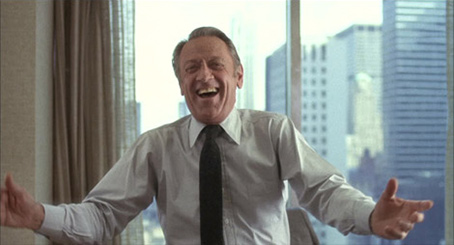
Network, Sidney Lumet's searing satire with a stunning script by Paddy Chayefsky (alliterate much?), peels back the covers and shows us what we like to think (what we might need to think) is an exaggerated reality of TV production. It is as exaggerated as Putin's tolerance. Money, the love of which is apparently the root of all evil – the Bible authors never really got their own houses in order, did they? – rules the roost. It's the cock of the hen house. It's the benchmark, the tide line, the one-armed bandit's golden vomit. And like most of us, Network's characters are in utter thrall to it. The few that aren't are known in the business as the good guys, those deluded souls who think that quality, professionalism and truth have an inherent value beyond the mighty dollar. The others that crave its green backed pat on the back are the bad guys, zigzagging and buck collecting in the murk where, with a pinch of irony, the highest of the high deliberate in earnest corporate judgement. Everything now seems to be owned by corporations that sit on metaphorical pyramids (and yes, their owners' disregard for both the labourers and the labour that went into building the pyramid upon which they sit is breathtaking in its totality). Some do earn their place with talent and hunger. Some metaphorically screw themselves up the greasy pole (racism-detector alert; not a play on words but a wooden stake, hard to climb and in my defence it was a small 'p'...). And in terms of squeezing oil-slicked truth out of the boob tube, aka the glass teat, there are a lot at that stake with no magnanimous ambitions but self-ambition. To be successful in television, playing the odds, you have to whore down to the lowest denominator and stay there for as long as you can. There are still many who shoot low and miss. It's a rare talent. I'm beginning to sound like Howard Beale... I wish.
There is a religious fervour to the truth of all things corporate. Personified by the great Ned Beatty is the corporate boss writ messianic, a company fundamentalist going by the name of Arthur Jensen. His speech to a stupefied Howard Beale (Peter Finch) maintains that the truth of capitalism is one on which all our lives depend. Hell, he almost convinces me! The bottom line (so well named for its tantalizingly allusive, sexual and degrading reasons) is the highest watermark of success. Television news used to be news. It is now (light?) entertainment. Why is there no 'heavy entertainment' division? It has not always been thus. Sorkin's own, almost painfully noble series, The Newsroom, berates the cancer that's belittling the great US nation and its concept of truth. Sorkin's directly post-West Wing show, Studio 60 on the Sunset Strip even acknowledges its debt to Network in episode one when a producer goes crazy ape-shit on live TV.
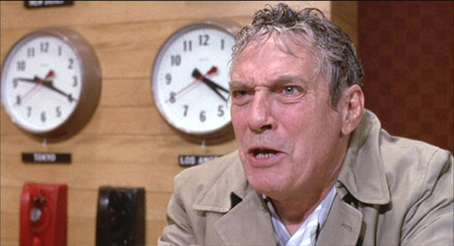
Speaking of going crazy ape-shit on live TV, let me re-introduce you to Howard Beale... A news anchor, Beale has had over a decade of reading the news for a once reputable company. He was a neophyte at the dawn of the great US news programmes (See Good Night and Good Luck). In short order, he loses his wife, his ratings, gains a bottle and is slowly disintegrating in front of his best fiend's eyes. Howard Beale is in a genuine personal crisis. He's played to the hilt of enlightened insanity by Peter Finch, one of only two actors to garner an acting Oscar posthumously; the other, of course, being Heath Ledger. I find it eerily coincidental that both characters (Beale and The Joker) are regarded as insane but make perfect sense given the context of the movies they are featured in. On air, Beale suddenly announces he's going to commit suicide live on the news show the following evening. His casual announcement is almost missed by indifferent directors and vision mixers but Beale's crisis becomes his friend's too. Max Schumacher (a simply superb William Holden) plays the head of the UBS news division. He's in conflict with a balding, leonine, stalking Robert Duvall (nice to see him in an overtly physical role in which he's all puffed up chest and prowling menace and you have to adore the frilly shirt cuffs in a later scene). He takes a chance on promoting Beale's madness because of a ratings spike. Weaving her own spell over both men is the angular and sharp elbowed Diane (played in full media Cruella De Vil mode by a wonderful Faye Dunaway). She is consumed by her work so much so that I think she has two lines in the film that have nothing to do with TV shows or the TV business. Even during sex, she's talking about ratings and hell, even during an orgasm she can hardly shut herself down for a second. I don't think I could handle being in the same building as someone this self-absorbed.
Beale becomes a TV prophet "...denouncing the hypocrisies of our times." He's joined by a host of utterly ridiculous supporting acts ('Sybil the Soothsayer' anyone?) and the cheesiest 'live TV' theme music I may have ever heard. It's so beyond cheese, it's meta-mould. Beale's rants have emotional and intellectual integrity but their presentation is pure TV bullshit. I cannot even be in the same room with a TV showing a studio audience in a whipped up ersatz frenzy. That's a level in mega-decibels of deceit I simply cannot tolerate. That kind of duplicity can go fake itself. I remember being a little startled to see audiences being stirred up by studio staff 'directing' their captive audiences' emotional responses. I knew TV was lies but I didn't realize how deeply those lies were rooted. This is why natural history documentaries are so trusted globally – there doesn't seem to be discernible artifice in these amazing programmes. Well, I could write another book about that... While Beale's 'madness' takes him over, Max's relationship with his wife breaks down and he moves in with Diane. Throughout the short run of the TV show, allegiances are stretched and ripped, loyalties crushed by the rabid genuflections to the Dollar Deity. Finally Beale steps over the line (he reveals a Saudi plot to buy the company he ultimately works for) and is summoned by Jensen (Ned Beatty) for the afore mentioned 'the way things are' strip-tearage.
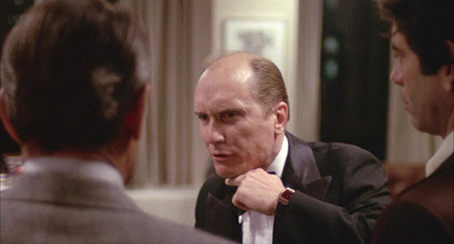
Up until the last six minutes including the end credits, Network is a full-blooded, semi-realistic drama with a through line of satire. But then there's a scene or rather a throwaway remark that in both a subtle and broad way (is that even possible?) rams Network into the satire camp with the subtlety of a lead sledgehammer. Chayefsky makes a narrative turn that is completely unexpected and it leads to an ending I can only describe (without spoilers) as inspired. Chayefsky is a brilliant dramatist and has a golden ear for naturalism in dialogue but rarely lets that pass without inserting his point of view into his character's wordplay. He's also bitingly funny. Of all the true gems on offer, my favourite line is still delivered by a studio worker on the phone as Duvall stalks past... "So far over 900 fucking phone calls complaining about the foul language!" to which Duvall replies "Shit!" Absolutely gorgeous. If you've had your eyes and ears open over the past few years, you would have to conclude that the real Fox News in the US is the American equivalent of the Daily Mail newspaper in the UK – parochial, right wing, obsequious, enforcing cultural stereotypes and staunchly maintaining insular prejudice... And let's not forget getting things wrong in the pursuit of ratings and sales. In some ways, we have travelled way, way beyond the world of the movie Network. We are now in a society where what we have now as 'news' is regarded as 'normal'. Once that happens (as it has done) you shouldn't trust any media to deliver anything approaching the truth. Ironically, you'll only find that or its footprints and shadows in the works of fiction by great writers.
Time erodes relative morality just as water does stone. In 2015, news is now an entertainment commodity dressed up in 'truth' the same way the emperor/empress is trussed up in his/her new, somewhat diaphanous clothes. Remember, in 2002, the American war with Iraq had a theme tune... Network blasts open the ridiculousness and danger of monetizing truth, cauterizes the open wound that is celebrity-worship but for me, more than anything, the movie remains a rich and profound character study. It reveals with lacerating clarity what one's base motivations say about our own humanity. With the mendacious TV industry as its backdrop, Chayefsky and director Sydney Lumet (the director of a few bona fide classics) pass the human condition through the colander of common sense and idealism and find it not only wanting but needing an overhaul. But should I be surprised? As my own partner keeps reminding me after some obscenity committed in the name of religion, get rid of the reasons for cruelty and mankind will find others because those are the kind of animals we are. A shining, moral light inside me screams at her cold truth, willing it not to be so but it is. The fact that movies like Network can present characters like Max (Holden) and have them uphold moral principles professionally, while out of hours they're having an affair putting them in danger of alienating the audience, is a good thing. The dichotomy itself gives them depth and wisdom. It's the recognition of a truth we can aspire to. I'll be bold and say it's a base line. Audiences know good and bad morality when they see it. And for many years, the cinema was where you went to see the bad guys get their comeuppance and in many cases this is still essentially true. And maybe it is true because in the real world, fairness is just a concept and we have to live with the vagaries of fate, coincidence and injustice and just keep in mind that we can always make things that little bit better if we're sensitive enough to recognise inequality when it pops up in front of us. Chayefsky's voice is an important one and with Network, he hits the bull's eye.
Ah, 70s film stocks... Outside in the sun or a well-lit room, the picture has a wonderfully warm feel of real film stock, real 35mm doing the job it loves to do. Expose at night or in a darkened room and the stock gets a little antsy. In fact, it breaks out in spots. Technology (even modern celluloid technology) has all but eliminated the idea of increased grain in darker scenes but in 1976, if you peer close enough, you can see the little blighters swimming around in the murk like they own the place. But hey, how much does that technical limitation of film stock impair the viewing of the movie? Not a single jot (or even 'dot'). Network is still a masterpiece and no film grain is going to dent that reputation.
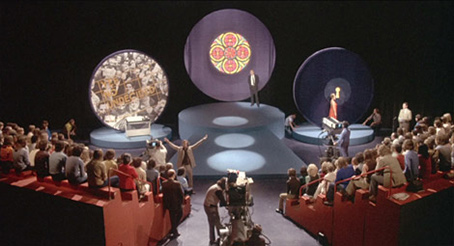
The uncompressed mono PCM audio is perfectly clear (for a dialogue dependent movie, this is somewhat crucial). Not much for the sub to concern itself with but hey, this isn't Michael Bay, thank seven shades of Christ for that. There are optional English subtitles for the deaf and hard of hearing.
The Directors: Sidney Lumet – a 1999 documentary on the director, containing interviews with Jack Lemmon, Rod Steiger, Christopher Walken and others (59' 39")
The graphics and cheesy music date this Extra alarmingly accurately. Presented in HD but clearly sourced from an NTSC standard definition tape/recording, this is the tiniest glimpse and a smattering of insights from and about one of America's leading directorial lights from a less super-hero obsessed age. Lumet has more great films to his credit than probably most of his contemporaries and a surprising number that didn't connect with audiences at all. His focus was on the strengths, frailties and potential of the human condition. I know that sounds broad (isn't that what every director does?) but Lumet's characters seem to be more real even in a satire like Network. Oh, let's not forget Lumet's debut feature 12 Angry Men, one of the most extraordinary dramas ever shot set in one room for 95% of the running time. The first time in the documentary we see Lumet on the streets, he's standing next to presumably an abnormally tall A.D. It looks like Frodo standing next to Gandalf. The Hill actor, Ossie Davis' story about his sprained toes and his director's subsequent directorial suggestion is a cracker. Picture quality aside, this is a classy Extra. And I never knew that Christopher Walken was ever that young...
Tune in Next Tuesday – a visual essay by Dave Itzkoff, the author of 'Mad as Hell: The Making of Network and the Fateful Vision of the Angriest Man in Movies' (47' 04")
This is a very solid Extra on the complete making of the movie from screenplay research to post Oscar success. Itzkoff is presumably reading from his own book (I imagine somewhat abridged). Visually, the editor has tried to edit in associative moments from the movie itself and tie it to the story being told (Dunaway's Oscar story is told over clips of her ecstatic at a dinner in the movie and the like). Posters pop in and out as other movies are referenced and there are many stills. It's not visually as fulfilling as standard 'Making of's but I'll give Itzkoff credit for what seems like a comprehensive and informative commentary. As a fan of the film, it's extraordinary to find out those little details that passed you by in an internet free era. I also seem to remember hearing acclaimed editor Alan Heim lying his ass off to defend his selection of a shot that briefly glimpses Ms. Dunaway's left nipple... He said the projectionist had matted it wrongly – not so if the movie itself is any proof...
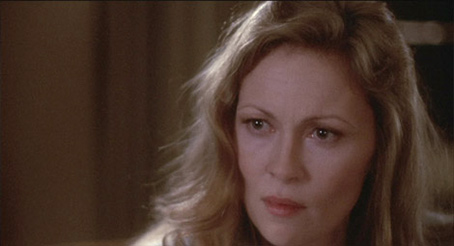
Theatrical Trailer (3' 17")
This is, as usual, made up from selected shots in a rough narrative (teasing a profanity at one point, a common practice in the 70s) interspersed by the lightning logo from the poster but unusually featuring neither music nor effects save the lightning crash. If I wasn't so familiar with these images thirty-nine years after the event, I'd have definitely been intrigued.
Reversible sleeve featuring original and newly commissioned artwork by Chris Walker...
and...
Collector's booklet featuring new writing on the film by Mike Sutton and an American Cinematographer article by director of photography Owen Roizman, illustrated with original stills and artwork.
I can't comment on the first of these last two because it wasn't included with the review disc. But I'll bet it'll come up to the high standards Arrow has maintained so far. As for the booklet, it's an absolute cracker. After a solid essay on the movie and its prescience (a great piece by Mike Sutton) there follows a truly gleaming gem in the reprint of the interview with cinematographer Owen Roizman from a 1977 American Cinematographer magazine. I adored all the stories, the technical detail and the problem solving. I know this sounds a bit elitist but I understood the technicalities (I was BBC trained in film) and found the interviewer's questions as insightful as Roizman's answers. It felt like a cinematographer interviewing a cinematographer. Classy, revealing and hugely informative stuff. There is also an illuminating page on the American TV Neilson ratings system that was enlightening. I'd let words and phrases like "20 share", "ratings point" and "Barter syndication" just merrily slip by. Not now...
I'll be buying the officially released Blu-ray not just for that one missing physical element but because this is a terrific disc of a terrific movie. Enough said.
Network is a cracking satire with some extraordinary performances and a script as relevant today as it was in the 70s. Despite the writer's intention of penning a satire of the human condition via the medium of television production, this acidic, acerbic, cynical and hugely enjoyable critique of the naked ape on television remains a classic to be savoured. Savour away.
|